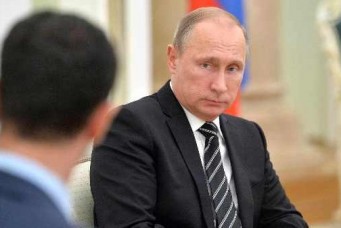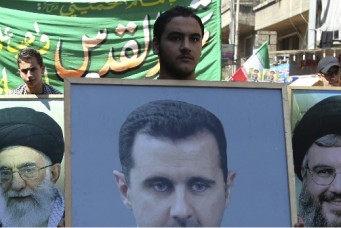Strategic Survival in Syria
How Russia and Iran maintain their grip in Syria under the shadows of the Ukraine war

An electronic billboard reading “No war” in support of Ukraine amid Russia’s invasion is seen in the rebel-held city of Azaz, Syria March 9, 2022. Khalil Ashawi/Reuters
When assessing the effects of the Russia–Ukraine war on Syria, it is first necessary to mention that the former is the military ally with the single greatest impact on the course of the conflict. Russia seeks to maintain not only its influence in Syria but also its diplomatic and military ambitions in the Middle East, taking advantage of the withdrawal of American troops in 2019, which greenlit the way for Turkey to penetrate deep into Syrian territory and capture large swaths of land along its border.
Russia saw further opportunity to expand its influence in Syria following U.S. withdrawal from Afghanistan. According to Merissa Khurma, director of the Middle East Program at the Wilson Center in Washington, the withdrawal from Afghanistan was an audible message to Arab countries, and the Middle East in general, to put their eggs in different baskets, including Russia’s. She described the American move as a slow withdrawal from the region.
Syria is also enthusiastic to show that choosing Russia was the best decision. Last March, it voted against a United Nations resolution condemning the Russian aggression against Ukraine. The country also recognized the Donetsk People’s Republic and Luhansk People’s Republic—declared independent by Russia—on June 29, 2022. The regions were annexed by Russia on September 30, 2022, though they are not recognized internationally.
The Damascus regime is well aware that a strong Russian presence remains a crucial player in its desired outcome in Syria. This presence encompasses a strong Russian military, namely with bases in Hmeimim and the Tartus port, a Russian naval facility, a strong Russian economy, as well as phosphate contracts and other economic incursions. Russia also uses its Security Council veto power for the benefit of its ally.
Additionally, it seems that Ankara’s pressure on the Syrian opposition to make concessions in favor of the Syrian regime also fits within this framework. Turkey played dual roles in Russia’s war against Ukraine. On the one hand, it provided Ukraine with the Bayraktar TB2 drone, which played a decisive role in undermining Russian military superiority. However, Turkey also aided Russia by contributing to the easing of the Ukrainian grain crisis.
Meanwhile, Iranian presence alongside Russian presence in Syria has become a reality. The countries have become strong and effective players since the United States and Europe turned a blind eye to overthrowing the Damascus government in years prior. Russia’s entry into Syria came under the supervision of international parties, including Israel, with the hopes of curbing Iranian influence in the country. Despite this, Iran strengthened past expectations, for which international parties now bear responsibility.
This piece will discuss the effects of the Ukraine War and the impact of global developments on Russia’s presence in Syria. This includes how Moscow works with Ankara, wherein Russia allows Turkey to strike the Kurdish presence on its borders, if not through direct incursion, then by drone attacks, while Turkey pressures the Syrian opposition toward rapprochement with the Al-Assad regime. Each has its own survival strategy, including Iran. Economically, Iran has attempted to establish itself socially and ideologically and to complete the fulfillment of the “Shiite Crescent,” while Russia is trying to secure a footing in the warm waters of the Mediterranean.
Regression Not Withdrawal
Despite Syrian support at the official level for Russia’s presence, it seems that things do not always go according to plan. The Russia–Ukraine war led to a redoubting of the “safe” relationship Syria had with Russia. The most notable change to affect the relationship between the two countries has been the redeployment of Russian commanders, soldiers and elite forces from Syria to the battle fronts against Ukraine. Such moves are not being reported in the media. Although observers reported that the redeployment was limited to a certain degree, DEBKAfile, an Israeli military intelligence website, claimed that satellite observations showed Russia’s withdrawal of the S-300 air defense system from the port of Tartus to the Black Sea via commercial ships. Moscow has neither denied nor confirmed these reports.
In the meantime, Russia is trying to maintain its momentum and influence in the Syrian arena, continuing its military activity and role as a balance between regional influencers: Turkey, Iran, and Israel. Russia recently expressed strong opposition to Turkey’s plans, beginning several months ago, to launch a new military operation against the Syrian Democratic Forces, and new attempts at incursion into Syrian territory. Nevertheless, analysts believe that Russia continues to view its air and naval bases, especially the port of Tartus and the Hmeimim base, as strategic. It is not easy to abandon such strategic positions, which guarantees Russia’s tactical influence in the warm Mediterranean waters—a presence that has become increasingly more important in the confrontation with the West and NATO.
But Russia’s ability to maintain its strategic momentum in Syria will diminish the longer its war in Ukraine continues; Moscow will find it difficult to sustain this balance on two battlefronts. A report by the Syrian Observatory, on the seventh anniversary of the Russian intervention in September, cited a decline in the intensity of air raids carried out by Russia in Syria and the resulting lower death toll of civilians in Syrian opposition areas. Since the start of its war in Ukraine, the lowest annual death toll was reported since the start of the Russian military intervention in support of President Bashar Al-Assad’s forces on September 30, 2015. Although a favorable result, it also shows Russia’s preoccupation with the war in Ukraine, and its possible rethinking of its priorities in Syria.
Iran’s “Syrian” Opportunities
In October 2022, Russia transferred its S-300 anti-aircraft system out of Syria in order to bolster its offensive against Ukraine, opening the way for Israel to launch raids with greater intensity. The defense system had been a barrier to the Israeli Air Force operation in the country, according to the Times of Israel. Conversely, the withdrawal of Russian intel regarding Iranian influence and military convoys in Syria led to a weakness in the accuracy of Israel’s goals against Iran. Russia provided Israel with coordinates and intelligence information regarding Iranian movements, and it seems that the Russia–Ukraine war played a decisive role in slowing this intelligence-sharing. In this equation, Iran may benefit from a weakening Russian position in Syria by attempting to further establish itself, which Israel is trying to prevent as much as possible.
Iran is also exploiting the situation to strengthen its presence and expand its military, economic, and even social influence by gaining control over territory in Syria. Iran has strategic interest in northeastern Syria and Hezbollah maintains influence along the Syria–Lebanon border. It seems that Russia intends to leave wider areas open for Iran’s capture, not only because of its preoccupation on the Ukrainian front but as a response to Iran’s support for the war in Ukraine through government partnership and arms support, although its drones have been repeatedly shot down in the conflict. Iran is even considering supplying Russia with ballistic missiles.
The relationship between Iran and Russia, whether it is in Syria, which is the most critical for Tehran, or in Ukraine, which is currently the most pivotal for Moscow, is nothing but pragmatic and momentary, and is not rooted in ideology. Russia is not enthusiastic about Iran’s regional ambitions. However, due to Iran’s military assistance, Russia attempts to please Tehran by allowing it to expand in Syria. While this angers Tel Aviv, Russia maintains its relationship with Israel by helping it strike Iranian targets.
Iran, Russia, and Survival Strategy
Even if they both seek economic benefit and strategic survival, Russia and Iran have very different ambitions in Syria. Russia seeks to maintain its foothold in the Mediterranean and to gain influence in the international community outside the geography of the former Soviet Union. It has achieved success at several points due to its presence in Syria and the prevention of the overthrow of the Al-Assad regime. Russian arms trade flourished, penetrating a market that was once monopolized by the United States and Europe, and Russia was able to make multiple partnerships and sales to Egypt and Turkey. Politically, Russia has proven that there is no path that transcends its role.
On the other hand, Iran aims to finish the road of the Shiite Crescent. Iran has been establishing dozens of sectarian militias in Syria with the aim of connecting areas in which the Shiite militias are located in Iraq, Syria, and Lebanon with each other. In addition to its military activity, Iran practices many different activities related to demographic change in the Sunni Arab regions, especially in Deir Ezzor in eastern Syria, long considered a non-radical tribal province, by supporting in many forms anyone who sides with it. Husseiniyas—Shiite mourning houses or religious commemoration halls—and cultural centers were also established and renovated so as to build Shiite influence in Syria and convert those it could.
Iran’s goal of establishing umbrella influence in Syria also includes economic and trade contracts, infrastructure investment, and religious tourism, not to mention its political desire to maintain a government favorable to its ambitions in the region.
Militarily, Russia and Iran have both tested their various weapons in Syria. Moscow has tested more than two hundred types of weapons in the country, while Iran has tested its arsenal of short-range missiles in Damascus and sometimes long-range from Iraq to Syria.
Socially, Russia focused on improving its reputation in Syria with loyalists— societal actors promised security by Russia in exchange for medium- to long-term loyalty—and broadcasting messages to the Arab and regional countries that Moscow does not abandon its allies, while, in contrast, Iran pursues sectarian policy. Only time will tell which strategy will survive.
Omar Abu Layla is a Syrian expert who focuses on security and governance dynamics in Northeast Syria. He is the CEO of @Deirezzor24 network, which has a group of researchers
inside the country. On Twitter: @OALD24




